South Africa
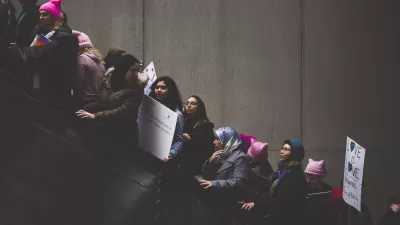
Breaking the Bias on Public Transport
How gender-sensitive data collection can make public transit safer for women.
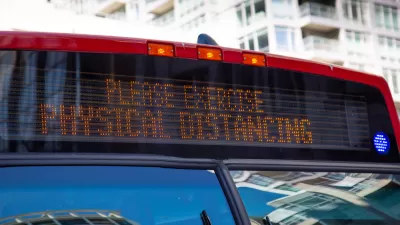
The Pandemic Is Not Ending—But Restrictions Are
The science hasn't changed but the politics have, and policymakers are responding appropriately. Transmission of the coronavirus during the Omicron wave remains at an all-time high, although infections are decreasing globally.
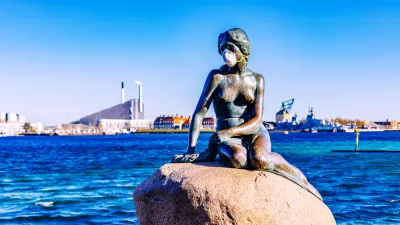
Coronavirus Geography: Denmark Could Be an Omicron Harbinger
Denmark is one of three countries that experts suggest watching to determine how the Omicron wave will affect the U.S. and other well-vaccinated nations. Cases are surging notwithstanding having 78% of its population fully vaccinated.

'A Tidal Wave of Omicron Coming'
U.K. Prime Minister Boris Johnson sounded an alarm on the public health threat posed by the Omicron variant. On Monday, he announced that a British resident had become the first person in the world whose death is tied to the new variant.
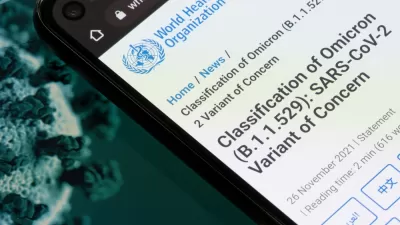
Omicron Variant: No Good Science Goes Unpunished
The discovery by South African scientists will enable the world to prepare for the newest coronavirus variant, but it will also cause enormous hardship due to the travel restrictions on flights to/from eight nations in southern Africa.

Will Israel Show Us the Way Out of the Pandemic?
If vaccinations are key to ending the pandemic, Israel may get there first as it has the highest rate by far of any nation. Paradoxically, it also has the world's second-highest rate of daily new COVID-19 cases.
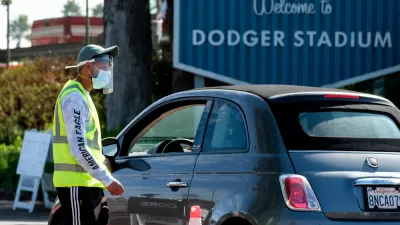
Awaiting the Mutant Storm(s)
Coronavirus infection, hospitalizations and most recently, deaths, are declining, but public health experts warn that more transmissible variant strains of the coronavirus threaten to overwhelm hospitals in the next few months.
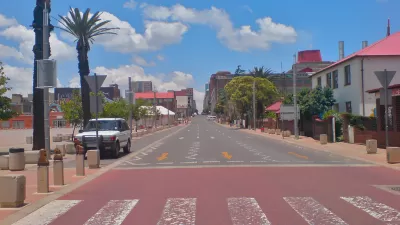
Bike Lanes For Who? Johannesburg's Bike Lanes Prove Divisive
The placement of new bike lanes in the city of Johannesburg has become yet another symbol of inequality between rich-white and poor-black residents.
Undoing the Spatial Legacy of Apartheid
In manicured neighborhoods for white residents and their "shriveled twins" for black residents, South Africa's nearly 50 years of Apartheid was imprinted on the nation's built landscape. To what extent was Nelson Mandela able to right these wrongs?
Interest in City-Center Living a Key to Integrating Cape Town
Twenty years after the end of apartheid in South Africa, Cape Town is preparing to become World Design Capital. Zoe Dare Hall looks at the coastal city's burgeoning real estate market, which reflects two decades of integrative planning.
In South Africa, Imagining Bicycles as a Vehicle for Empowerment
Bicyclists are hard to come by in South Africa. Two authors have gone in search of the reasons why a country with "so much poverty, often unwalkable commuter distances, and poor public transportation," lacks a larger bike culture.
Selling the Importance of Street Vending
In the latest entry in a series on informal urban livelihoods, Sally Roever of WIEGO provides insight into how planners can better understand, acknowledge and manage street vending through the development of appropriate policies and best practices.
The iShack: Quick, But Sustainable, Fix for South Africa's Housing Crisis
In a project initiated by the Sustainability Institute, and backed by the Bill and Melinda Gates Foundation, development experts are taking innovative steps to address South Africa’s housing shortage.
Planes that Run on Natural Gas
Qatar Airlines is gearing up their jets to run on a fuel derived from natural gas - so don't expect to see fuel tanks holding liquefied gas. Similar to the "Messerschmitt Fuel" in World War II that was derived from coal, they are called synfuels.
Steer Clear of the 5 Most Dangerous Roads in the World
Writing for Yahoo! Travel, Aefa Mulholland identifies five of the most dangerous roads in the world - from India's chaotic city streets to Bolivia's mountain hugging back roads.
Zoning for Apartheid
Lisa Findley & Liz Ogbu explain how architecture and urban planning were critical to apartheid in South Africa and how Le Corbusier and Ebenezer Howard influenced the racial segregation practice.
Trying to Tackle Mobility Issues in South Africa
New government efforts in South Africa are trying to improve mobility for those who rely on public transportation, walking and biking.
Empty Stadia and Some Regret in South Africa
One year after it hosted the World Cup, South Africa is looking at empty and expensive stadia and a persistent debt that's causing some to regret hosting the soccer tournament.
Johannesburg's BRT System Makes Good with Minibus Drivers
Minibus drivers in Johannesburg, South Africa, were not happy about plans to build a city-wide bus rapid transit system, worrying it would take their business away. After sometimes violent debates, the drivers have compromised with the city.
The Future of Johannesburg's Mining Landscapes
Gold mining was an integral part of what made the city of Johannesburg, South Africa one of the most economically important cities on the continent. But as mining winds down, some are trying to find new ways to use the landscape of mining operations.
Pagination
Urban Design for Planners 1: Software Tools
This six-course series explores essential urban design concepts using open source software and equips planners with the tools they need to participate fully in the urban design process.
Planning for Universal Design
Learn the tools for implementing Universal Design in planning regulations.
Smith Gee Studio
City of Charlotte
City of Camden Redevelopment Agency
City of Astoria
Transportation Research & Education Center (TREC) at Portland State University
US High Speed Rail Association
City of Camden Redevelopment Agency
Municipality of Princeton (NJ)


































